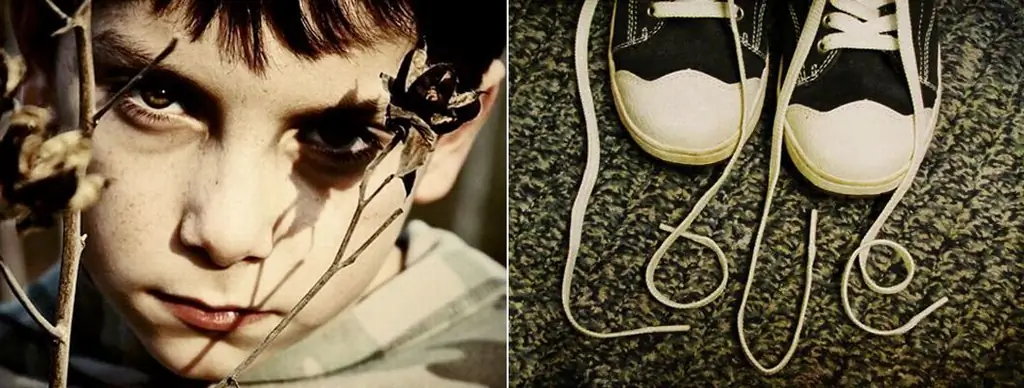- Author Adrian Jeff jeff@psychologosportal.com.
- Public 2024-01-07 19:39.
- Last modified 2025-01-24 14:09.

Difficulties of transitional age. How to find a common language with a teenager
A teenager can snap back and be rude, leave and come when he pleases, get into bad company, be stubborn and cruel. One may behave hysterically and demonstratively, while the other, on the contrary, immerse himself in the virtual world, avoiding communication, start smoking or even use drugs. Attempts to talk, press, punish are perceived with hostility and only increase the tension in the family. What happens to a teenager? How to find a common language with him now and maintain a trusting relationship for the future?
“Don't meddle in my life!”, “None of your business!”, “What do you understand?” - what parents of teenagers can not hear! Yesterday, a problem-free child suddenly becomes uncontrollable and aggressive. The parents' words provoke strong resistance or are completely ignored.
A teenager can snap back and be rude, leave and come when he pleases, get into bad company, be stubborn and cruel. One can behave hysterically and demonstratively, while the other, on the contrary, plunge into the virtual world, avoiding communication, start smoking or even use drugs. Attempts to talk, press, punish are perceived with hostility and only increase the tension in the family.
Adults unsuccessfully try to explain to a teenager that he needs to learn, it's time to think about the future, to decide on a profession, but he doesn't seem to hear. Many parents justify him, they say, a difficult period, a transitional age - everything will pass, and he will change his mind. However, a difficult period passes, and relations with an already matured child have not been improved.
What happens to a teenager? How to find a common language with him now and maintain a trusting relationship for the future?
Conditions for development
System-vector psychology of Yuri Burlan helps to understand these difficult issues. She explains that every person from birth is endowed with sets of mental properties - vectors. The combination of vectors determines how a person perceives the world, what he wants, what he strives for.
Before the onset of adolescence, while the child is developing, he is not yet capable of independent survival. Therefore, the most important thing for him is the feeling of security and safety that his parents (first of all, his mother) provide him. If the child feels this, his innate mental properties receive a favorable environment for development, which occurs until the end of puberty. During this period, mental properties develop (or do not develop) from the level of a primitive man to what is necessary in modern society. The degree of development of properties depends on how a person will develop relationships with people, whether he will be able to take place in paired relationships, how resistant he will be to stress, whether he will be able to realize himself in society, and much more.
When a child feels that his parents understand and support him, reckon with his opinion, when a calm and trusting atmosphere reigns in the family, then the little person grows and develops calmly. If in the family they constantly swear, they shout at the child or even raise their hand, then he does not feel protected, and this negatively affects his development.

Even worse consequences can be when parents do not understand how the child's psyche works, demand the impossible from him and do not allow what is laid down by nature to develop. For example, if you overly indulge and praise a nimble child with a skin vector, who, on the contrary, needs to be taught to discipline, then in the future he will not be able to organize either himself or others. If you constantly rush and jerk a slow and diligent child with an anal vector, he will never learn to do his job perfectly, although he could potentially become a real professional.
Transitional age. Gender characteristics
For any teenager, adolescence is a difficult period. System-vector psychology explains that at this time the child begins to try to take responsibility for his life. The feeling of security and safety that his parents previously provided him, he tries to provide for himself.
This process is different for girls and boys. A woman gets a sense of security from a man, so the girls begin to "scamper", that is, they try themselves in creating a pair relationship. This is an unconscious process, because one of the main natural tasks of a woman is to preserve herself and her offspring, and she does this through a man.
Some girls can often change their chosen ones and be more defiant in their sexual behavior (paint brightly, wear more revealing clothes). Others are more restrained and conservative, they can choose one candidate and subsequently create a family with him. Each girl has her own mental characteristics, her own pitfalls of growing up, which parents should know in order to insure and support their daughter where necessary.
Inexperience, girls can make the wrong choice, shocking their parents. In order not to harm, it is important for the parent to understand what is happening and behave correctly. It is important for a girl to feel that she can be liked by representatives of the opposite sex, can be chosen by a boy, while it is not important which one. This is the second stage - to understand who you need. And if at this first stage the parents suddenly interfere, seeing an absolutely inappropriate young man next to her, impose their authoritative opinion, then the girl reacts with a protest, even more defending her choice, because in this case, the parents prevent her from taking place as a woman.
To avoid conflicts, you should not enter into open confrontation. Show that you respect your daughter's choices. So that she herself can wonder if this is the person she needs. Communicate all together in a benevolent and friendly atmosphere, ask the young man a few questions about his interests, plans for the future. This may be enough - your girl herself will be able to assess the situation. Support her, do not push her to confront you. The less security she feels in the family, the more furiously she will look for this security outside. And the more difficult it will be for her to break off erroneous relationships, even if she feels that she is going in the wrong direction and with the wrong one.
Boys have their own difficulties in adolescence. They will take on an adult male role in providing themselves with a sense of security and safety through their contribution to society. From the age of 6, participating in the choice of his surroundings at school, the boy takes his first steps towards adulthood. During puberty, a young man is actively trying his properties for adaptation in society, and the "first blow" is taken by the parents. One can observe how some boys suddenly begin to criticize their parents, while others violate the boundaries of what is permissible by their parents.

Teenagers are looking for their place in society, using the level of development of mental properties that they have developed by this time. It is during this period that the fruits of education become visible. The higher the level of development of vectors in a teenager, the easier it is for him to go through this stage. He unconsciously gropes for what his destiny is, and when he feels that he has something to offer society, he confidently moves forward into adulthood.
Obstacles to growing up
If a teenager has not received the necessary development, grew up in psychologically unfavorable conditions for him, then the transitional age becomes an even more difficult test for him. Lack of the necessary skills for successful socialization, plus the resulting trauma, does not allow him to fully take responsibility for his life. He feels bad, he does not understand where to move. Misunderstanding and pressure from his parents takes away his last hope for adaptation and further shatters his already unstable state.
So, in case of trouble …
- Adolescents with a skin vector become extremely irritable, cannot control themselves, tend to "pump" their rights, can skip school, come home after midnight.
- Guys with an anal vector can show cruelty and stubbornness, argue with adults, express dirty words, fall into a stupor.
- Teenagers with a visual vector are hysterical and demonstrative, in severe cases up to emotional blackmail with suicide.
- Children with a sound vector, on the contrary, close themselves off from the outside world, ignore adults and peers, often plunging into the virtual world and avoiding real communication. In their case, it is easy to miss a severe depression, since outwardly their inner rushes and despair of a failed search for the meaning of life may not manifest themselves in any way.
Modern children are polymorphic. The presence of counter vectors specifies special throwing at a turning age. So, adolescents with a skin and anal vector are often torn apart by contradictions: on the one hand, skin ambitions require bold decisions, a change in landscape, action, and on the other, the anal vector suffers from the inability to leave home, experiences self-doubt, fear of independence. Especially if you got used to overprotection from your parents or went through the stress of conditions that are unsuitable for the development of the vector (for example, rushing).
The support of a parent who understands what is happening with the child can significantly soften the passage of a difficult age.
Cry for help
Many parents think that the child is behaving this way in spite of them. They are disappointed that they gave him everything, and he, ungrateful, did not live up to their expectations. In fact, this behavior is an unconscious cry for help. A person brings out what is inside him. When we feel bad, we react to the world around us with hatred and hostility.
One of the mistakes parents make is trying to push the teenager back into childhood, to force him to obey. System-vector psychology of Yuri Burlan makes it clear that children do not have a natural connection with their parents (in response to the maternal instinct), children fly out of the nest without looking back. All relationships with children after puberty are a cultural superstructure, the fruits of upbringing.
An emotional connection can be built with visual children, children with an anal vector are connected with their parents with a feeling of gratitude, with a skin one - with a sense of duty, but there is no natural connection. So the task of parents during the transitional age of children is to maintain a cultural connection and support the child in manifestations of independence.
With pressure, scandals, attempts to punish, we only make things worse. The teenager by his behavior shows that we are acting wrong. At this age, it is too late to raise a child, you need to learn to interact with him. To help a teenager go through the difficult path of puberty, you need to understand his psyche, find out what he lives and what he is capable of. And already on this understanding to build trusting relationships.
The key is understanding
Sometimes it seems to adults that a teenager does not hear or perceive their words. Yes, he really does not perceive them, since they are trying to impose on him that which is alien to him. When parents start talking to a child based on his desires, his properties, then it turns out to build a dialogue with a teenager based on trust.
If parents understand how the child now perceives the world around him, help him deal with himself, then he will feel that he is understood and accepted. Feeling this, he himself will turn to his parents for advice, share his experiences, ask for help. By understanding his mental characteristics, you can direct him to where he will find the best use for himself. These will be the first steps towards building a relationship with a teenager.
One of the mothers shares her experience, she tells how she overcame the crisis when her relationship with her daughter was on the verge of breaking up …
Already at the free introductory online lectures on System-Vector Psychology by Yuri Burlan, you can begin to understand how a child lives, how to support him in a difficult period, how to help him find his place in this world. Waiting for you! Register by the link:






